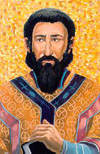Death
through sin
“Therefore
as sin came into the world through one man and death through sin, and so
death spread to all men because all men sinned”
(Romans 5:12).
As the best
physicians always take great pains to discover the source of diseases,
and go to the very fountain of the mischief, so does the blessed Paul also.
Hence after having said that we were justified, and having shown it from
the Patriarch, and from the Spirit, and from the dying of Christ (for He
would not have died unless He intended to justify), he next confirms from
other sources also what he had at such length demonstrated. And he confirms
his proposition from things opposite, that is, from death and sin. How,
and in what way? He enquires whence death came in, and how it prevailed.
How then did death come in and prevail? Through the sin of one. But what
means, for that all have sinned? This; he having once fallen, even they
that had not eaten of the tree did from him, all of them, become mortal...

Baptized into
his death
“Do you not know that all of us who have been baptized into Christ
Jesus were baptized into his death? We were buried therefore with him by
baptism into death, so that as Christ was raised from the dead by the glory
of the Father, we too might walk in newness of life” (Romans 6:3-4).
What does being baptized into his death mean? It has to do with our
dying as he did. We do this by our baptism, for baptism is the cross. What
the cross is to Christ, baptism is to us. Christ died in the flesh; we
have died to sin. Both are deaths, both are real.
But if it is real, what is our part, what must we contribute? Paul goes
on to say, “As Christ was raised up from the dead by the glory of the Father,
even so we also should walk in newness of life” (Rom. 6:4). Here Paul tells
of the importance of the resurrection.
Do you believe that Christ was raised from the dead? Believe the same
of yourself. Just as his death is yours, so also is his resurrection; if
you have shared in the one, you shall share in the other. As of now the
sin is done away with.
Paul sets before us a demand: to bring about a newness of life by a
changing of habits. For when the fornicator becomes chaste, when the covetous
person become merciful, when the harsh become subdued, a resurrection has
taken place, a prelude to the final resurrection which is to come.
How is it a resurrection? It is a resurrection because sin has been
mortified, and righteousness has risen in its place; the old life has passed
away, and new, angelic life is now being lived.
The old age of
sin
But tears come into my eyes when I think of how much Paul is asking
of us and how little we have changed after our baptism, yielding ourselves
to sin, going back to the oldness we had before, returning to Egypt, and
remembering the onions after the manna. We undergo a change for only ten
or twenty days after our baptism, but then take up former things again.
But we must see that it is not for a few days that we are required to
change, but rather, for a whole lifetime. The youth of grace must not lead
to the old age of sin. The love of money, the slavery to wrong desire,
or any sin whatsoever, makes us grow old in soul and body. Our souls become
rheumatic, distorted, decayed, and tottering with many sins.
Such, then, are the souls of sinners. Not so those of the righteous,
for they are youthful and strong, always in the prime of life, ready for
any fight. Not so for the sinners, for they are subject to the fall at
the least resistence. The sinful lose their ability to see, to hear, and
to speak, for they spew forth words that are foul.
Suddenly young
Like the prodigal son, the sinful end up in the mire of the pig’s slop,
reduced to the greatest wretchedness, and are in a worse state than any
disordered person. But when the prodigal was willing, he became suddenly
young by his decision. As soon as he said, “I will return to my Father,”
this one word conveyed to him all the blessings; or rather, not the word
alone, but the deed which he added to the word. He did not say, “I will
return,” and then stay where he was.
Thus, let us also do this, no matter how far we have gotten carried
away in our journey. Let us go back to our Father’s house, not lingering
over the length of the journey. For we shall find, if we be willing, that
the way back again is very easy and very speedy. Only let us leave this
strange land of sin where we have been drawn away from the Father. For
our Father has a natural yearning toward us and will honor us if we are
changed. He finds great pleasure in receiving back his children.

The easier it
will be
And how am I to go back again? Start back by avoiding vice, going no
farther into it, and you have come home. When a person who is sick does
not get any worse it is a sign that he is getting better, and so is the
case with vice. Go no further and your deeds of wickedness will have an
end.
If you do so for two days, you will keep off on the third more easily;
and after three days you will add then, then twenty, then a hundred, then
your whole life. For the further you journey back the easier it will be
to see how you should be, and the more you will begin to see of your great
rewards.
So it was with the prodigal son who, when he returned, was greeted with
flutes and harps and dancing and feasts. His father who might have chided
him for his ill-timed extravagance did nothing of the sort. He did not
even mention it, but rather, looked at him as without stain, throwing himself
upon him and kissing him.
God's exceeding
desire
Let us, then, as we have such examples before us, be of good cheer
and keep from despair. For God is not so well pleased with being our Master
as he is with being our Father; he is not so pleased with our being his
slaves as he is with our being his children. This is what God truly wants.
This is why he did all that he has done, not sparing his only begotten
Son, that we, as adopted sons and daughters, might love him as a Father.
God’s exceeding desire to be loved comes from loving exceedingly. This
is why Jesus said, “Anyone who loves their father or mother more than me,
is not worthy of me.” He even calls us to esteem that which is most precious
to us—our soul—as second to the love of God, for our Father wishes to be
loved by us entirely.
When we do not love a person we do not wish to be with them, no matter
how great or noble that person may be. But when we love someone, we want
to be with them, and we view their love for us with great honor even if
they are not a person of great rank. For this reason—and not because of
our great rank—God values our love. So much, in fact, that he suffered
greatly on our behalf.
What is there
to fear?
Let us, then, incur dangers for him, running as if for the greatest
of crowns. Let us have no fear of poverty or disease, nor hardship or even
death itself. For what is there to fear? Losing all of your money? If you
bear it nobly, it will be as great a reward to you as if you gave it all
to the poor—as long as you freely lose it because you know you have a greater
reward in heaven.
What else is there to fear? Having people revile and persecute you?
If so, those people have weaved a great crown for you fi you bear it meekly.
Rejoice and be glad, Jesus said, when people speak evil against you falsely,
for great is your reward in heaven. And even if they speak the truth against
us, is it our advantage if we bear it humbly, as the Pharisee spoke rightly
about the publican, but only the publican went home justified because he
bore it in humility.
Why do we week profit? What did Judas profit for being with Christ?
Or what profit was the law to the Jews? Or paradise to Adam? Or the promised
land to the Israelites? We should keep our mind fixed on one point only:
how may we do what is best with the resources we have been given.

A serpent nestling
in our bed
If we do this, not even the devil himself will get the better of us.
We must remember that we deal with a crafty enemy. If we were suddenly
aware of a serpent nestling in our bed, we would go to great lengths to
kill it. But when the devil nestles in our souls, we tell ourselves we
are in no danger, and thus we lie at ease. Why? Because we do not see him
and his intent with our mortal eyes.
This is why we must rouse ourselves and be more sober. Fighting an enemy
we can see makes it easy to be on guard, but one that cannot be seen we
will not easily escape. Also, know that the devil has no desire for open
combat (for he would surely be defeated), but rather, under the appearance
of friendship, intends to insinuate the venom of his malice.
For example, he used Job’s wife under guise of love for her husband;
Jephtha, too, he persuaded under the pretext of religion to slay his daughter,
offering a sacrifice the law forbade. It was the same with Adam, for he
put on the air of being concerned for his well-being, saying that his eyes
“shall be opened” by eating from the tree.
Be on your guard, and arm yourself with weapons of the Spirit. Become
acquainted with the devil’s plans that you may keep from getting caught
in his traps, and instead, expose him. Paul got the better of him because
he was “not ignorant of his devices.” Learn and avoid the devil’s stratagems,
so that after obtaining victory over him, we may, whether in this present
life or in that which is to come, be proclaimed conquerors and obtain those
unalloyed blessings.
excerpt from
Homily
10 on Romans
[Translated by J. Walker, J.
Sheppard and H. Browne, and revised by George B. Stevens. From Nicene
and Post-Nicene Fathers, First Series, Vol. 11. Edited by Philip Schaff.
(Buffalo, NY: Christian Literature Publishing Co., 1889.]
 John
Chrysostom (c. 349-407)
was an important early church father. He was born of noble parents in Antioch
in 349. John acquired the skills for a career in rhetoric, as well as a
love of the Greek language and literature. As he grew older he became more
deeply committed to Christianity and went on to study theology. John became
a hermit around 375. He was ordained a deacon in 381, and then ordained
as a presbyter (priest) in 386 by Bishop Flavian I of Antioch. John
Chrysostom (c. 349-407)
was an important early church father. He was born of noble parents in Antioch
in 349. John acquired the skills for a career in rhetoric, as well as a
love of the Greek language and literature. As he grew older he became more
deeply committed to Christianity and went on to study theology. John became
a hermit around 375. He was ordained a deacon in 381, and then ordained
as a presbyter (priest) in 386 by Bishop Flavian I of Antioch.
Over
the course of twelve years, he gained popularity because of the eloquence
of his public speaking, especially his insightful expositions of Bible
passages and moral teaching. Known as "the greatest preacher in the early
church", John's sermons have been one of his greatest lasting legacies.
The most valuable of his works from this period are his Homilies on various
books of the Bible. He emphasised charitable giving and was concerned with
the spiritual and temporal needs of the poor. He also spoke out against
abuse of wealth and personal property. He founded a series of hospitals
in Constantinople to care for the poor.
In
398, John was requested, against his will, to take the position of Archbishop
of Constantinople. John was fearless when denouncing offences in high places.
He was banished twice by the secular authorities. After his death, which
occured in 407) he was named Chrysostom, which comes from the Greek word
which means, "golden-mouthed." |

